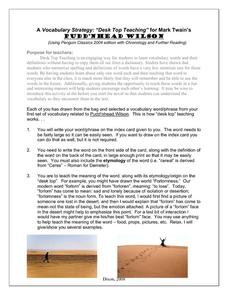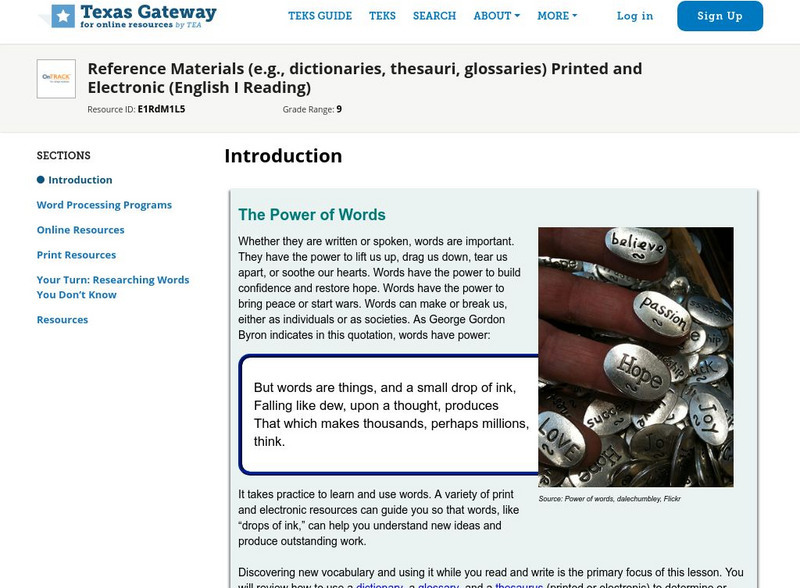Curated OER
Pudd'nhead Wilson: Vocabulary Strategy
Invite your pupils to do the teaching when it comes to the vocabulary in Pudd'nhead Wilson. Each individual is assigned one word to research in depth and teach to classmates, one pupil at a time.
ReadWriteThink
Sonic Patterns: Exploring Poetic Techniques Through Close Reading
Robert Hayden's poem "Those Winter Sundays" serves as the anchor text in a five-part lesson that takes the mystery out of poetry analysis by modeling explicit strategies for pupils to employ to conduct a close reading of a poem. After...
Texas Education Agency (TEA)
Reference Guides (English III Reading)
An interactive resource introduces users to dictionaries, glossaries, and thesauri and the significant differences among these reference guides. Users learn which reference is best for which kind of search, examine sample entries from...
National Endowment for the Humanities
Charles Baudelaire: Poète Maudit (The Cursed Poet)
After learning the main ideas of the Decadent movement, students work in small groups to read and translate poems by the French poet Charles Baudelaire using basic etymology skills. They then read the accurate English translations to see...
K12 Reader
Spelling Rule Exceptions for Plural Nouns: Words That End in CH and SH
Have you done the dishes? Or closed the hatches? A practice worksheet invites learners to check 20 words with different endings, and to add either -s or -es to each.
Curated OER
Ordinary People: Desktop Teaching
Turn the pupil into the teacher to help your learners pick up and retain vocabulary from Ordinary People by Judith Guest. Each individual selects a word, studies it in depth, and then teaches their word to the rest of the class, one...
Core Knowledge Foundation
Greek And Latin Root Words
Students examine Greek and Latin root words. They research the history of the English language, solve word games and puzzles, write paragraphs about the impact of Greek and Latin on the English language, and create flip chart study guides.
Lumen Learning
Lumen: Rhetorical Reading: Read Strategically: Diversify Your Vocabulary
This instructional activity focuses on strategies to diversify and retain new vocabularies such as reading a variety of types of writing and learning roots, suffixes, prefixes, and the etymology of words.
TED Talks
Ted: Ted Ed: Mysteries of Vernacular: X Ray
The story of the word X-Ray is one of great thinkers. French philosopher Rene Descartes isolated the letters X, Y and Z to stand for unknowns, and centuries later, Wilhelm Rontgen discovered the X-ray, using the X for the unknown nature...
TED Talks
Ted: Ted Ed: The True Story of 'True'
The older the word, the longer (and more fascinating) the story. With roots in Old English, 'true' shares etymological ancestors with words like betroth and truce, but also with the word tree. In fact, trees have been metaphors for...
TED Talks
Ted: Ted Ed: Mysteries of Vernacular: Bewilder
The history of the word bewilder is more straightforward than you might think. Roots can be traced back to the Old English words wilde (undomesticated) and deor (untamed animals), eventually combined into the word wilderness. Jessica...
TED Talks
Ted: Ted Ed: Mysteries of Vernacular: Dynamite
With an explosive meaning, the word dynamite's past is as historical as it is etymological. Jessica Oreck and Rachael Teel describe how Alfred Nobel invented dynamite. [2:14]
TED Talks
Ted: Ted Ed: Mysteries of Vernacular: Earwig
An earwig is neither an ear nor a wig; it is an insect. Jessica Oreck and Rachael Teel explain how folklore gave this bug its name, combining entomology with etymology. [2:16]
Texas Education Agency
Texas Gateway: Reference Materials Printed and Electronic
Learn how to use dictionaries, glossaries, and thesauri in order to determine meanings of words and phrases, including their denotations, connotations, and etymologies.
Texas Education Agency
Texas Gateway: Reference Materials: Printed and Electronic
You will learn how to use dictionaries, glossaries, and thesauri in order to determine meanings of words and phrases, including their denotations, connotations, and etymologies.
Texas Education Agency
Texas Gateway: Reference Materials Printed and Electronic
Find out how to use dictionaries, glossaries, and thesauri in order to determine meanings of words and phrases, including their denotations, connotations, and etymologies.
Texas Education Agency
Texas Gateway: Reference Materials Printed and Electronic
Learn how to use dictionaries, glossaries, and thesauri in order to determine meanings of words and phrases, including their denotations, connotations, and etymologies.
TED Talks
Ted: Ted Ed: A Brief History of Melancholy
If you are a living, breathing human being, chances are you have felt sad at least a few times in your life. But what exactly is melancholy, and what (if anything) should we do about it? Courtney Stephens details our still-evolving...
TED Talks
Ted: Ted Ed: Mysteries of Vernacular: Inaugurate
From avian omens to the beginning of a new policy or the reign of a new politician, Jessica Oreck follows the flight path of the word inaugurate. [2:08]
TED Talks
Ted: Ted Ed: Mysteries of Vernacular: Tuxedo
How did tuxedo's roots extend from Native American history to black tie evening wear? Jessica Oreck reveals what the Delaware Indians and formal fashion have in common. [2:04]
TED Talks
Ted: Ted Ed: Why Is There a "B" in Doubt?
Say the word "doubt" aloud. What is that "b" doing there? Does it have any purpose? Gina Cooke explains the long and winding history of "doubt" and why the spelling, though it seems random, is a wink to its storied past. [3:28]
Texas Education Agency
Texas Gateway: Cognates (English I Reading)
Use your knowledge of cognates from other languages to help you understand unfamiliar words.
TED Talks
Ted: Ted Ed: Mysteries of Vernacular: Yankee
Is it a doodle dandy? A baseball team? The origins of the word yankee are unclear, though its usage in America as a pejorative is well-documented. Jessica Oreck and Rachael Teel track the varying levels of contempt that the word yankee...
TED Talks
Ted: Ted Ed: Where Do New Words Come From?
Marcel Danesi explains how new words enter a language. L.11-12.1a Gram/Usage changes
Other popular searches
- Teaching Etymology
- Greek Etymology
- Name Etymology
- Etymology Lesson Plans
- Book Etymology
- Etymology Book Making
- Balance Beam Etymology
- Vocabulary and Etymology
- Math Words Etymology
- Etymology Lesson
- Teaching Etymology 0000051
- Etymology Activities























